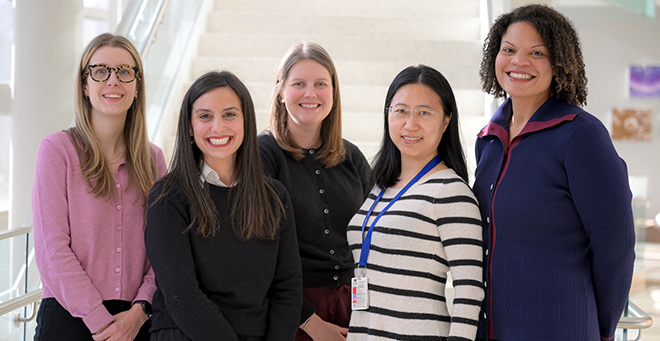Jamie Faro, PhD, and Varun Ayyaswami, MD
Photo: Faith Ninivaggi
A program focused on health coaching and using technology to increase physical activity and address obesity is among the inaugural winners of the Mel Cutler Population Health Pilot Research Award.
Health Informatics and Implementation Science FIT-COACH, led by Jamie Faro, PhD, assistant professor of population & quantitative health sciences, and Varun Ayyaswami, MD, assistant professor of medicine, is one of four projects addressing critical public health challenges to receive a $50,000 Mel Cutler award.
“We are grateful for the opportunity the award presents to us. We have a great interdisciplinary team of researchers and clinicians who provide a unique perspective on the management of obesity as we progress with its different medications and exercise interventions,” Dr. Ayyaswami said.
The study will evaluate a digital health intervention that integrates fitness tracker technology and health coaching into clinical care for obese patients on weight-loss medications like GLP-1/GIPs. The study will enroll patients who have been on weight-loss medications for at least three months who were referred by their primary care providers.
“We’re working with patients who have been on medicine for three months and that’s a really important time frame because patients are just reaching the therapeutic dose. We suggest that for health benefits to continue long term, there needs to be a sustainable lifestyle intervention component working in coordination with medication,” Dr. Faro said.
The 12-week pilot trial aims to highlight the need for a combined approach with lifestyle therapy to achieve lasting health benefits. As many as 40 patients will be enrolled in the study. Following a visit with their primary care provider, the patients will have up to six visits with a health coach over the course of the 12-week intervention.
The study’s findings will inform the design of a larger trial, paving the way for scalable, effective strategies to enhance physical activity and health outcomes in clinical practice.
Faro and Ayyaswami are working with patients and providers at UMass Memorial Medical Center and a community medical group clinic in the Worcester area.

From left to right: Melissa Goulding, PhD; Elise Stevens, PhD; Grace Ryan, PhD, MPH; Chan Zhou, PhD; and Sarah Forrester, PhD
Photo: Faith Ninivaggi
The Mel Cutler Population Health Pilot Research Award was launched in 2024 by the Population and Quantitative Health Sciences Advance Science Workgroup, led by Catarina I. Kiefe, MD, PhD, the Melvin S. and Sandra L. Cutler Chair in Biomedical Research and professor of population & quantitative health sciences.
The award supports preliminary research and interdisciplinary collaboration, with a on “science that makes a difference,” advancing the field through knowledge creation, new methods and technologies, and implementation strategies.
Dr. Kiefe said the award was designed to support junior faculty members in the Department of Population and Quantitative Health Sciences who are seeking additional research funding.
“Pilot data is very important in accessing extramural research funding. You usually need to have pilot data to demonstrate that you’ve thought about the project that you’re proposing and that you can implement it. These awardees have very good ideas and a good chance to use their data from these projects to apply for extramural funding from agencies like the National Institutes of Health,” Kiefe said.
The recipients of the Mel Cutler Population Health Pilot Research Award also include:
- Sarah Forrester, PhD, assistant professor of population & quantitative health sciences: Dr. Forrester’s project examines how maternal stress affects epigenetic age acceleration in Black mother-infant pairs, a vital study for improving maternal and infant health outcomes.
- Grace Ryan, PhD, MPH, assistant professor of population & quantitative health sciences; Melissa Goulding, PhD, assistant professor of population & quantitative health sciences; and Elise Stevens, PhD, assistant professor of population & quantitative health sciences: An innovative mixed-methods project that aims to combat social media misinformation and promote cancer prevention behaviors, such as HPV vaccination and sunscreen use, among adolescents.
- Chan Zhou, PhD, assistant professor of population & quantitative health sciences: Dr. Zhou’s research aims to identify long noncoding RNAs as new biomarkers that can better predict cardiovascular disease risk, particularly in diverse populations, advancing health equity.













